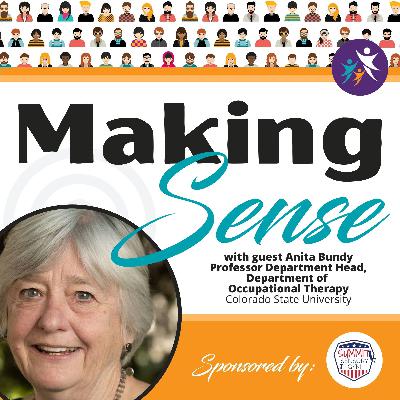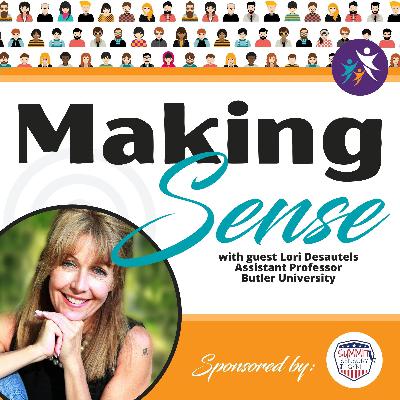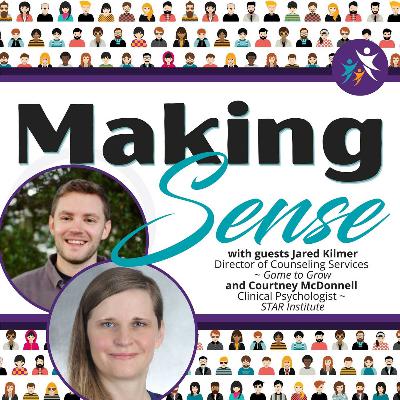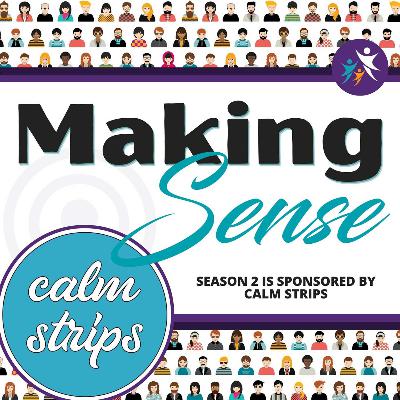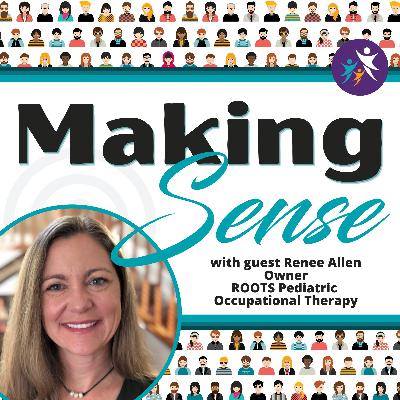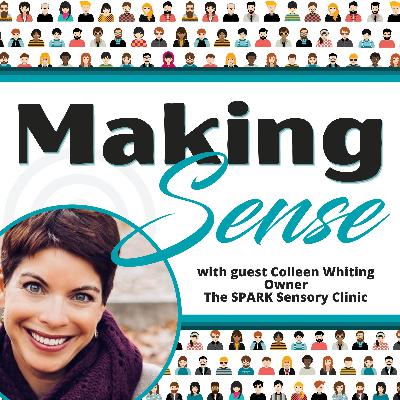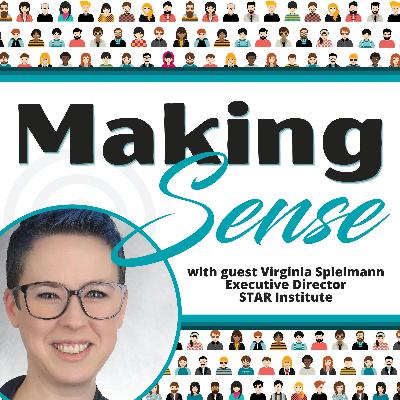A Family Nurse Practitioner and mom shares her personal and professional encounters with ADHD and SPD
Description
Family Nurse Practitioner and Parent, Holly Healy offers both personal and professional insights into sensory differences. She recognizes the way that traits of ADHD and SPD present similarly and offers insight into her process as a parent of a child with sensory differences and her work as a diagnostician.
The views expressed in the following presentation are those of the presenter(s) and do not necessarily reflect those of STAR Institute.
Resources Mentioned In this episode:
- Ahn R. R., Miller L. J., Milberger S., McIntosh D. N. Prevalence of parents' perceptions of sensory processing disorders among kindergarten children. American Journal of Occupational Therapy. 2004;58(3):287–293. doi: 10.5014/ajot.58.3.287
- Chang, Y.-S., Gratiot, M., Owen, J. P., Brandes-Aitken, A., Desai, S. S., Hill, S. S., Arnett, A. B., Harris, J., Marco, E. J., & Mukherjee, P. (2016). White matter microstructure is associated with auditory and tactile processing in children with and without sensory processing disorder. Frontiers in Neuroanatomy, 9. https://doi.org/10.3389/fnana.2015.00169
- Ghanizadeh A. Sensory processing problems in children with ADHD, a systematic review. Psychiatry Investig. 2011 Jun;8(2):89-94. doi: 10.4306/pi.2011.8.2.89
- Kranowitz, C. S., Wylie, T. J., & Turnquist, T. H. (2006). The out-of-sync child has fun: Activities for kids with sensory processing disorder. Perigee Book.
- Miller, L. J., Fuller, D. A., & Roetenberg, J. (2014). Sensational kids: Hope and help for children with sensory processing disorder (SPD). Penguin Group.
- National Institute for Children’s Health Quality (NICHQ) Vanderbilt Assessment Scales for Diagnosing ADHD: https://www.nichq.org/sites/default/files/resource-file/NICHQ-Vanderbilt-Asses sment-Scales.pdf
- School-Based Intensive Education: https://sensoryhealth.org/basic/school-based-intensive-star-for-school
- STAR article: Is It Sensory Processing Disorder or ADHD?: https://sensoryhealth.org/node/1114
- Unyte formerly Integrated Listening Systems (iLs): https://integratedlistening.com/
- Wood, J. K. (2020). Sensory processing disorder: Implications for primary care nurse practitioners. The Journal for Nurse Practitioners, 16(7), 514–516. https://doi.org/10.1016/j.nurpra.2020.03.022
Episode transcript: Transcript of the episode’s audio
Carrie Schmitt
I'm happy to be joined today by one of STAR's Board Members, Holly Healy. Holly, thank you for being here. I was wondering if you would introduce yourself.
Holly Healy
Sure. Thanks for having me. My name is Holly Healy and I have been a board member for two years now. I'm also a family nurse practitioner, and I practice in pediatrics for the past 17 years.
Carrie Schmitt
So I'm really excited to have this conversation because I think you could really help other family nurse practitioners, pediatricians, who also are on the frontlines of encountering people who are coming with concerning behaviors or some school reports that they can't make sense of. So tell me a little bit about how you got connected with the STAR Institute?
Holly Healy
Sure, I'd love to. So when my oldest who is now 11, was around four or five, we started to notice some behavioral differences with her and a lot of dysregulation, so it manifested in behavioral outbursts, and just really difficulty with sleep. And so we went to a counselor to try to figure it out, because we kept saying, well, she's anxious, she's anxious. So the counselor handed me, Lucy Jane Miller's book, and my husband and I read it together. And it was like a revelation. And we thought, this is her. This is this exactly explains, you know, what is going on. And so I read as much information as I could, and we got her into OT, we started changing things at home. And we didn't see a lot of progress at first. And so reading the book, I realized in going on the website, I realized, oh, there are trained OTs, by star, that have gone through a mentorship program. So when we finally kept hitting several walls, you know, with our OT treatment, I drove her four miles to the closest OT, who had been mentored by Starr and took her to Asheville, North Carolina, and we met with this amazing therapist, and the first thing she told me was, you know, we see things differently, we have a different lens in which we see children. With sensory processing disorder, she took two hours, and it changed our lives. And so from there, we launched into implementing a sensory diet every day, we got her into chiropractor, we got her into vision therapy, and then we also got her into horseback riding. So we learned that this wasn't just a once a week, go to OT, you know, and it was more this is, you know, this is part of like your life, this is how you need to change things daily. And, you know, it wasn't drastic, it was just small changes, and how we would view how does she need to start her day off, you know, it may not be what normal kids do to start their days. And so I also got myself certified with at the time it was called integrated listening systems, they've changed now to unite. So I got myself certified, and we put her through the focus program that I did, and got her started on the dream pads. So we just really implemented everything because we were honestly desperate to get her to a happy place. And, but also, I just, I'm a big fan of just learning information. And with her OT, I could never go back into the room. I didn't know what, what they were doing and how he could help her. So with with that particular visit, I stayed with them the whole time with this therapist that was trained by Starr and I was like, Oh, my goodness, this is fascinating, because I had so many questions that I could never really get answered, because the traditional treatment is I'm going to take your child back for an hour, I'll be back. And I'll give you two minutes to let you know what we did. And then I'll see you next week. So it was it was transforming. And so I then implemented it more into my practice. And I started to see children differently, that we're coming in with struggles, and I started to just completely change my perspective on how to help parents, from my own personal experience, and then just educating myself. So that's why I wanted to be a board member to just so I could help. From my perspective as a parent and a professional, help the you know, the organization, get get the word out, you know, how can we make this? How can we make everybody more aware of how to how to integrate it.
Carrie Schmitt
Thank you for sharing that a couple of things jumped out at me. One is, I'm thinking it's Dr. Miller's book, sensational kids. Yes. Okay. Yeah. So we'll put all of this in our show notes. So if you're listening and you're interested in reading This book, sensational kids hope and help for children with sensory processing disorder, you know, that has been transformative for people who are otherwise unaware of sensory processing differences, to read that book and know that this is its own diagnostic category, right, it's not listed in the DSM. Right now the Diagnostic and Statistical Manual, it we have had efforts to get sensory processing differences or disorder, you know, classified as such, yet the science is telling us it truly exists. And one of the other things that you pointed out was that in that book, Dr. Miller shares, the development of the Star model. Model is a different approach to occupational therapy intervention for children with sensory processing differences. And one of the key features of our model is that it is fully relational, and that all of our intervention includes one or both parents in every session. And then every fifth or sixth session is parents only. So it's parent education focused, we're in, we recognize that you're the expert in your child, and we have a sensory lens, and we could guide you to adapt your lifestyle, to the new understanding of who your child is through that sensory lens. And it sounds like that's exactly what happened for you, this occupational therapist said, I'm going to put this sensory lens on, tell you what I see about your daughter. And then here are some lifestyle changes that would support improved regulation in her system. And then you as the expert went out and resourced all of those things, and implemented them with the support of a sensory trained occupational therapist. So I loved that. That's
Holly Healy
Yeah, and she gave us you know, some exercises to get started. And then I thought, I used this out of sync child has fun it was it has a bunch of activities in it. So what I did, and this might help parents, you know, it has some great information, I think I got the flashcards to one of the symposiums. But every every morning, I would wake up early, and I would just piece together, okay, this is what I'm going to do today. Because my daughter is a, she's a heavy into the heavy work, she was, you know, her ot really say, give her the heavy work. So I'd put together, you know, some things that would give me about 15 minutes every day of, you know, of activities for her to do says she could start her day off, right. So it's really just, you know, for parents, it's just taking


